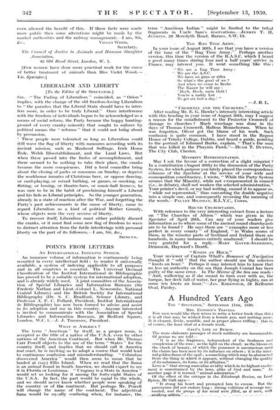POINTS FROM LETTERS
AN INTERNATIONAL INDEXING SYSTEM.
An immense volume of information is continuously being recorded in every intellectual field ; to render it universally available, a system of indexing applicable to all purposes and in all countries is essential. The Universal Decimal Classification of the Institut International de Bibliographic ltas proved to be a suitable system for international adoption, and is already widely used. A joint committee of the Associa- tion of Special Libraries and Information • Bureaux (Sir Frederic Nathan and Lieut.-Colonel L. Newcombe, National Central Library) and the British Society for International Bibliography (Dr. S. C. Bradford, Science Library, and Professor A. F. C. Pollard, President, Institut International the Bibliographic) has now been formed to advise and assist in its adoption and use in this country. Anyone interested is invited to communicate with the Association of Special Libraries and Information Bureaux, 26 Bedford Square, London, W.C. 1.—J. J. THOMSON, President.
WHAT IS AMERICA ?
The term " American " by itself, as a proper noun, is accepted as the title of a native of the U.S.A.- even by other nations of the American Continent. But when Mr. Thomas Carr Powell objects to the use of the term " States " for the country itself, and implies that we should call it America tout court, he is inviting us to adopt a course that would lead to continuous confusion and misunderstanding. " Columbus discovered America" would then seem to mean that he landed at (say) Ellis Island. When we read that the llama is an animal found in South America, we should expect to see it in. Florida or Louisiana. " Uruguay is a State in America " would set us looking for it among the forty-eight States of the U.S.A. In fact, the part would be equal to the whole, and we should never know whether people were speaking of the country or of the continent. But perhaps Mr. Powell Will change the name of the continent. The adjectival Morns- would be eqaally confusing when, for instance, the. term " Anielican Indian" might be limited to the tribal fragments in Uncle Sam's reservations.—JENKIN T. H, JENKiNS, 20 Meredyth Road, Barnes, s.w,13.
• THE RAG TIME ARMY.
In your issue of August 30th, I see that you have a version of the tune of the " Rag Time Army." Perhaps another version, this time the version of the R.A.S.C. which I heard
• a good many times during four and a half years' service` in France, may interest you. It went something Rie this : " We are a Rag Time Army ;
• - We are the A.S.C.
We have no guns or rifles So what's the good of we 2 And when we come to Berlin The Kaiser he will say : ' Hoch, Hoch, mein Gott !
• You're a ruddy Lot To get six bob a day.' " —J. B. L.
" CROMWELL. AND THE CHURCHES.',' . .
After reading Mr. E. G. Hawke's intensely interesting article with this heading in your issue of August 30th, may I suggest a reason for the misallotment to the Protector Cromwell of damage to churches ? Much wreckage was done in the days of Thomas Cromwell, Malleus Monachorum. When he was forgotten, Oliver got the blame of his work. Such confusion is quite common. I have stood in the Regent House of Trinity College, Dublin, and heard a guide, pointing to the portrait of Edmund Burke, explain, " That's the man that was killed in the Phaynix Pawk."—HUGH T. Durron The City Club, Chester.
MINORITY REPRESENTATION. -
May I ask the favour of a correction of a slight misprint In a contribution (August 30th) to the discussion of the Party, System, for which purpose you lately placed the correspondence columns of the Spectator at the service of your wide and cosmopolitan constituency, I wrote, " While the Party System secures that- the Minority, while not unrepresented in council (i.e., in debate), shall not weaken the selected administration.". Your printer's devil, or my bad writing, caused it to appear as; " while not represented," thus converting the double negative into a simple one, and consequently reversing the meaning of the words.--PAULET Mu DMAY, R.L.Y.C., Cowes.
ROUND CHURCHYARDS.
With reference to the very interesting extract from a lecture on " The Churches of Albion " which was given in the S:ectafor of April 20th. Can any of your readers give information as to where some of the ancient round churchyards are to be found ? He says there are " examples more or less perfect in every county ' of England, " in Wales scores of them, in the remoter parts of Scotland and Ireland there are hundreds, in many instances entirely unaltered." I should be very grateful for a reply.—MARY GAYER-ANDERSON, Drumsesk, Hayward's Heath.
"KNOTS AN HOUR."
Your reviewer of Captain Whall's Romance of Navigation thought it " odd " that the author should use the soleeisni " knots an hour." Perhaps it may interest him to know that no less an authority on the sea than Joseph Conrad has been guilty of the same error. In The Mirror of the Sea one reads : " And, wallowing as if she meant to turn over with us, the barque, her deck full of water, her gear flying in bights, ran at sonic ten knots an bour."—J As. KIRKWOOD, 58 Kelbume
Oval, Paisley.










































 Previous page
Previous page